Evaluating Stakeholder vs. Shareholder Perspectives in Business Ethics
VerifiedAdded on 2020/05/04
|13
|3748
|95
AI Summary
The debate between stakeholder and shareholder perspectives is central to discussions on business ethics and corporate governance. Stakeholder theory argues that companies should consider the interests of all stakeholders, including employees, customers, suppliers, and communities, alongside those of shareholders. This approach emphasizes ethical responsibilities beyond profit maximization, promoting long-term sustainability and social responsibility. In contrast, shareholder primacy focuses on maximizing shareholder value as the primary goal of a business, often prioritizing short-term financial gains. This perspective is rooted in traditional economic theories that advocate for efficient market outcomes through profit-driven motives. The assignment delves into how these differing views impact corporate strategies, decision-making processes, and ethical considerations. It examines case studies where companies have successfully integrated stakeholder interests to enhance their reputations and achieve long-term growth. Additionally, it addresses the challenges businesses face in balancing these perspectives, especially in competitive markets where shareholder expectations are high. By analyzing theoretical frameworks and real-world applications, this assignment aims to provide insights into how organizations can navigate the complexities of ethical governance while satisfying diverse stakeholder needs.
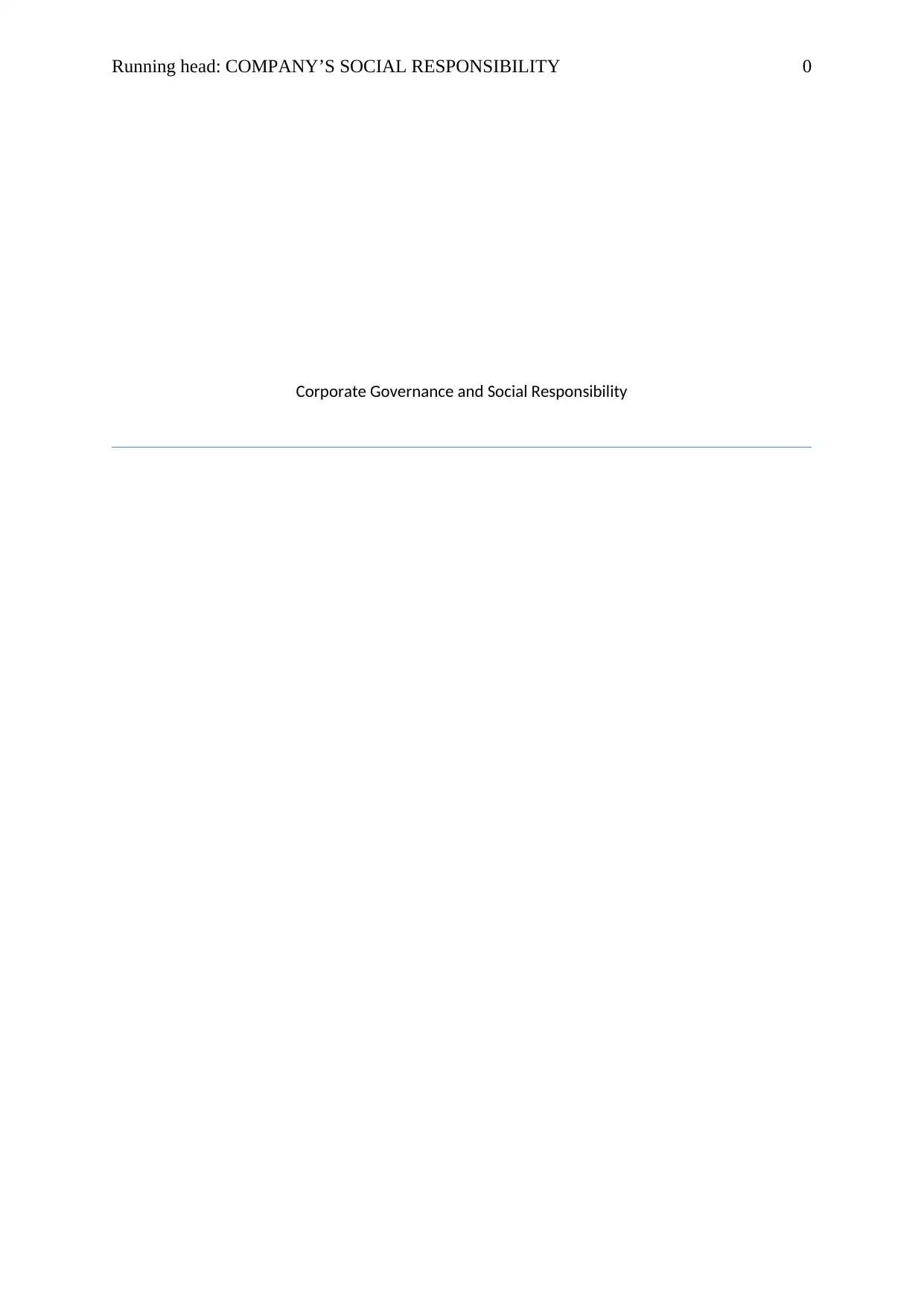
Running head: COMPANY’S SOCIAL RESPONSIBILITY 0
Corporate Governance and Social Responsibility
Corporate Governance and Social Responsibility
Paraphrase This Document
Need a fresh take? Get an instant paraphrase of this document with our AI Paraphraser
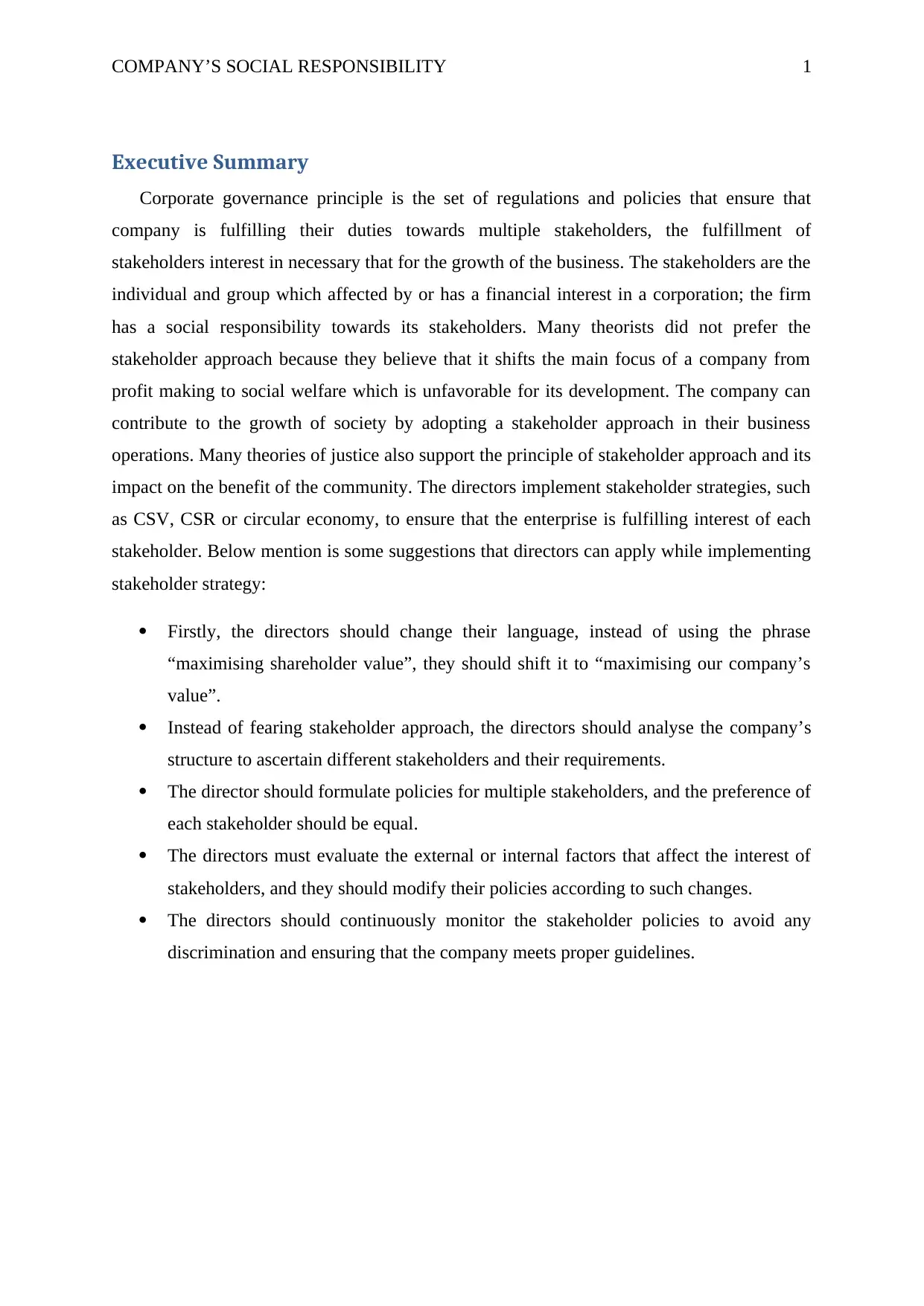
COMPANY’S SOCIAL RESPONSIBILITY 1
Executive Summary
Corporate governance principle is the set of regulations and policies that ensure that
company is fulfilling their duties towards multiple stakeholders, the fulfillment of
stakeholders interest in necessary that for the growth of the business. The stakeholders are the
individual and group which affected by or has a financial interest in a corporation; the firm
has a social responsibility towards its stakeholders. Many theorists did not prefer the
stakeholder approach because they believe that it shifts the main focus of a company from
profit making to social welfare which is unfavorable for its development. The company can
contribute to the growth of society by adopting a stakeholder approach in their business
operations. Many theories of justice also support the principle of stakeholder approach and its
impact on the benefit of the community. The directors implement stakeholder strategies, such
as CSV, CSR or circular economy, to ensure that the enterprise is fulfilling interest of each
stakeholder. Below mention is some suggestions that directors can apply while implementing
stakeholder strategy:
Firstly, the directors should change their language, instead of using the phrase
“maximising shareholder value”, they should shift it to “maximising our company’s
value”.
Instead of fearing stakeholder approach, the directors should analyse the company’s
structure to ascertain different stakeholders and their requirements.
The director should formulate policies for multiple stakeholders, and the preference of
each stakeholder should be equal.
The directors must evaluate the external or internal factors that affect the interest of
stakeholders, and they should modify their policies according to such changes.
The directors should continuously monitor the stakeholder policies to avoid any
discrimination and ensuring that the company meets proper guidelines.
Executive Summary
Corporate governance principle is the set of regulations and policies that ensure that
company is fulfilling their duties towards multiple stakeholders, the fulfillment of
stakeholders interest in necessary that for the growth of the business. The stakeholders are the
individual and group which affected by or has a financial interest in a corporation; the firm
has a social responsibility towards its stakeholders. Many theorists did not prefer the
stakeholder approach because they believe that it shifts the main focus of a company from
profit making to social welfare which is unfavorable for its development. The company can
contribute to the growth of society by adopting a stakeholder approach in their business
operations. Many theories of justice also support the principle of stakeholder approach and its
impact on the benefit of the community. The directors implement stakeholder strategies, such
as CSV, CSR or circular economy, to ensure that the enterprise is fulfilling interest of each
stakeholder. Below mention is some suggestions that directors can apply while implementing
stakeholder strategy:
Firstly, the directors should change their language, instead of using the phrase
“maximising shareholder value”, they should shift it to “maximising our company’s
value”.
Instead of fearing stakeholder approach, the directors should analyse the company’s
structure to ascertain different stakeholders and their requirements.
The director should formulate policies for multiple stakeholders, and the preference of
each stakeholder should be equal.
The directors must evaluate the external or internal factors that affect the interest of
stakeholders, and they should modify their policies according to such changes.
The directors should continuously monitor the stakeholder policies to avoid any
discrimination and ensuring that the company meets proper guidelines.
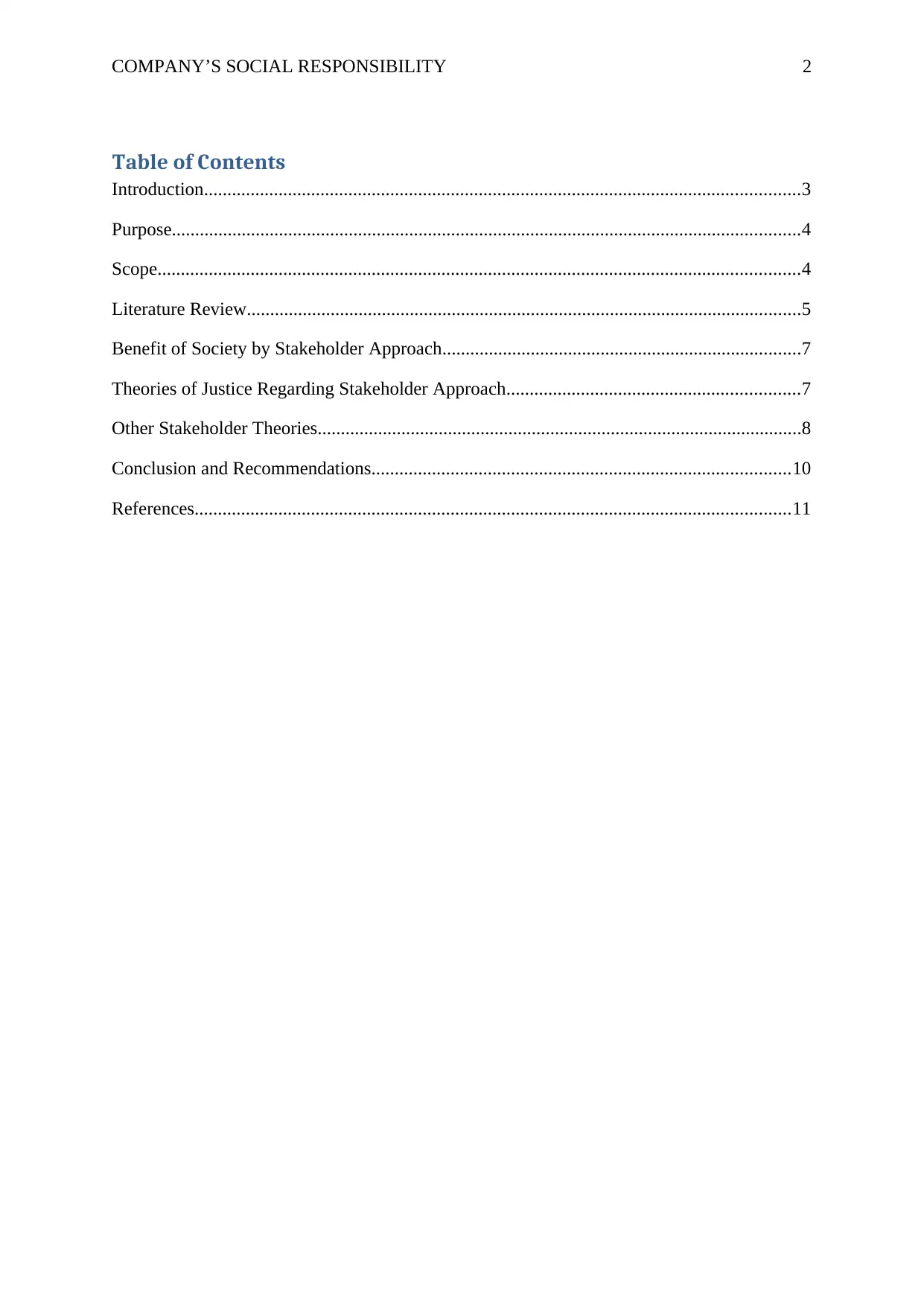
COMPANY’S SOCIAL RESPONSIBILITY 2
Table of Contents
Introduction................................................................................................................................3
Purpose.......................................................................................................................................4
Scope..........................................................................................................................................4
Literature Review.......................................................................................................................5
Benefit of Society by Stakeholder Approach.............................................................................7
Theories of Justice Regarding Stakeholder Approach...............................................................7
Other Stakeholder Theories........................................................................................................8
Conclusion and Recommendations..........................................................................................10
References................................................................................................................................11
Table of Contents
Introduction................................................................................................................................3
Purpose.......................................................................................................................................4
Scope..........................................................................................................................................4
Literature Review.......................................................................................................................5
Benefit of Society by Stakeholder Approach.............................................................................7
Theories of Justice Regarding Stakeholder Approach...............................................................7
Other Stakeholder Theories........................................................................................................8
Conclusion and Recommendations..........................................................................................10
References................................................................................................................................11
⊘ This is a preview!⊘
Do you want full access?
Subscribe today to unlock all pages.

Trusted by 1+ million students worldwide
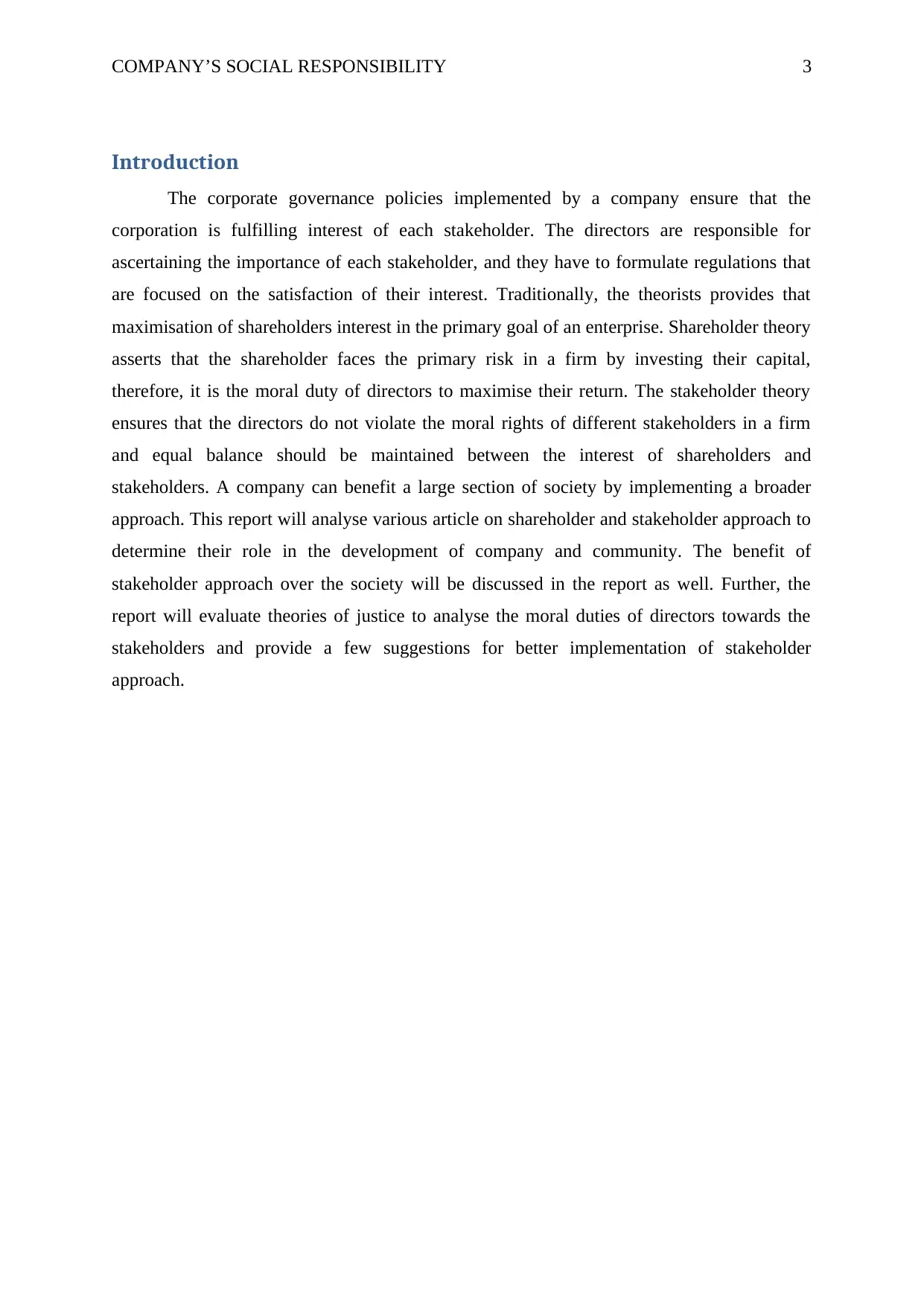
COMPANY’S SOCIAL RESPONSIBILITY 3
Introduction
The corporate governance policies implemented by a company ensure that the
corporation is fulfilling interest of each stakeholder. The directors are responsible for
ascertaining the importance of each stakeholder, and they have to formulate regulations that
are focused on the satisfaction of their interest. Traditionally, the theorists provides that
maximisation of shareholders interest in the primary goal of an enterprise. Shareholder theory
asserts that the shareholder faces the primary risk in a firm by investing their capital,
therefore, it is the moral duty of directors to maximise their return. The stakeholder theory
ensures that the directors do not violate the moral rights of different stakeholders in a firm
and equal balance should be maintained between the interest of shareholders and
stakeholders. A company can benefit a large section of society by implementing a broader
approach. This report will analyse various article on shareholder and stakeholder approach to
determine their role in the development of company and community. The benefit of
stakeholder approach over the society will be discussed in the report as well. Further, the
report will evaluate theories of justice to analyse the moral duties of directors towards the
stakeholders and provide a few suggestions for better implementation of stakeholder
approach.
Introduction
The corporate governance policies implemented by a company ensure that the
corporation is fulfilling interest of each stakeholder. The directors are responsible for
ascertaining the importance of each stakeholder, and they have to formulate regulations that
are focused on the satisfaction of their interest. Traditionally, the theorists provides that
maximisation of shareholders interest in the primary goal of an enterprise. Shareholder theory
asserts that the shareholder faces the primary risk in a firm by investing their capital,
therefore, it is the moral duty of directors to maximise their return. The stakeholder theory
ensures that the directors do not violate the moral rights of different stakeholders in a firm
and equal balance should be maintained between the interest of shareholders and
stakeholders. A company can benefit a large section of society by implementing a broader
approach. This report will analyse various article on shareholder and stakeholder approach to
determine their role in the development of company and community. The benefit of
stakeholder approach over the society will be discussed in the report as well. Further, the
report will evaluate theories of justice to analyse the moral duties of directors towards the
stakeholders and provide a few suggestions for better implementation of stakeholder
approach.
Paraphrase This Document
Need a fresh take? Get an instant paraphrase of this document with our AI Paraphraser
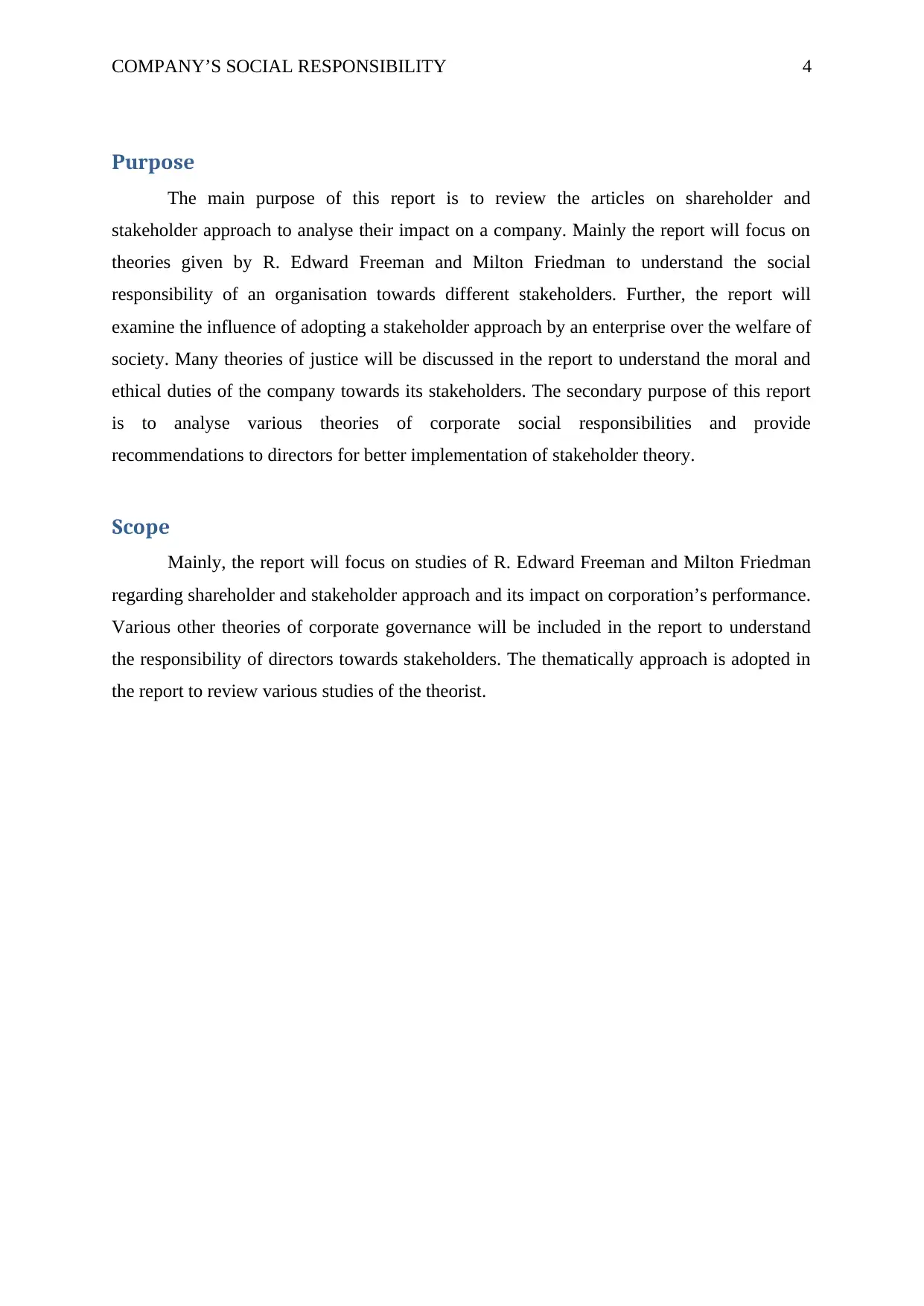
COMPANY’S SOCIAL RESPONSIBILITY 4
Purpose
The main purpose of this report is to review the articles on shareholder and
stakeholder approach to analyse their impact on a company. Mainly the report will focus on
theories given by R. Edward Freeman and Milton Friedman to understand the social
responsibility of an organisation towards different stakeholders. Further, the report will
examine the influence of adopting a stakeholder approach by an enterprise over the welfare of
society. Many theories of justice will be discussed in the report to understand the moral and
ethical duties of the company towards its stakeholders. The secondary purpose of this report
is to analyse various theories of corporate social responsibilities and provide
recommendations to directors for better implementation of stakeholder theory.
Scope
Mainly, the report will focus on studies of R. Edward Freeman and Milton Friedman
regarding shareholder and stakeholder approach and its impact on corporation’s performance.
Various other theories of corporate governance will be included in the report to understand
the responsibility of directors towards stakeholders. The thematically approach is adopted in
the report to review various studies of the theorist.
Purpose
The main purpose of this report is to review the articles on shareholder and
stakeholder approach to analyse their impact on a company. Mainly the report will focus on
theories given by R. Edward Freeman and Milton Friedman to understand the social
responsibility of an organisation towards different stakeholders. Further, the report will
examine the influence of adopting a stakeholder approach by an enterprise over the welfare of
society. Many theories of justice will be discussed in the report to understand the moral and
ethical duties of the company towards its stakeholders. The secondary purpose of this report
is to analyse various theories of corporate social responsibilities and provide
recommendations to directors for better implementation of stakeholder theory.
Scope
Mainly, the report will focus on studies of R. Edward Freeman and Milton Friedman
regarding shareholder and stakeholder approach and its impact on corporation’s performance.
Various other theories of corporate governance will be included in the report to understand
the responsibility of directors towards stakeholders. The thematically approach is adopted in
the report to review various studies of the theorist.
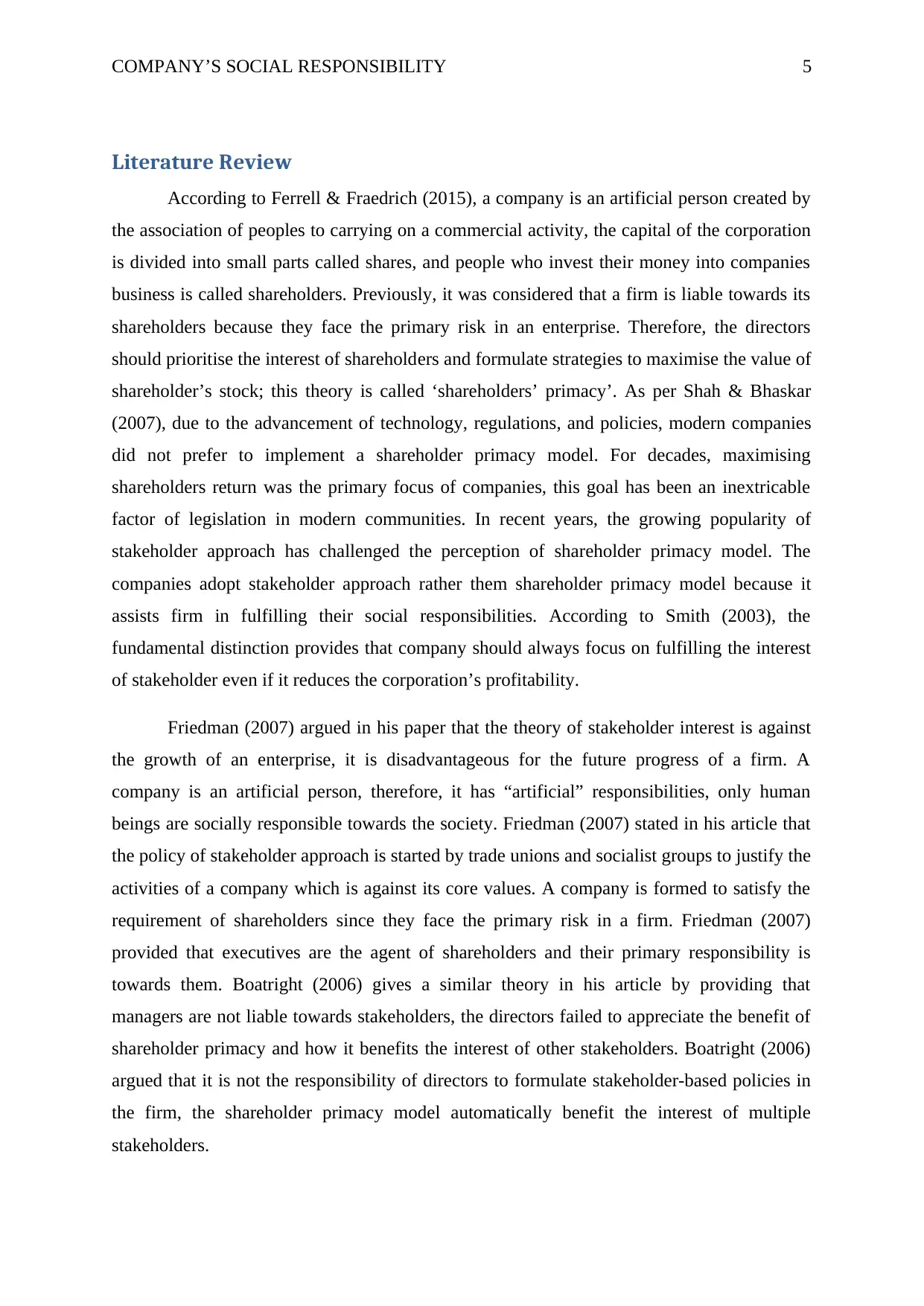
COMPANY’S SOCIAL RESPONSIBILITY 5
Literature Review
According to Ferrell & Fraedrich (2015), a company is an artificial person created by
the association of peoples to carrying on a commercial activity, the capital of the corporation
is divided into small parts called shares, and people who invest their money into companies
business is called shareholders. Previously, it was considered that a firm is liable towards its
shareholders because they face the primary risk in an enterprise. Therefore, the directors
should prioritise the interest of shareholders and formulate strategies to maximise the value of
shareholder’s stock; this theory is called ‘shareholders’ primacy’. As per Shah & Bhaskar
(2007), due to the advancement of technology, regulations, and policies, modern companies
did not prefer to implement a shareholder primacy model. For decades, maximising
shareholders return was the primary focus of companies, this goal has been an inextricable
factor of legislation in modern communities. In recent years, the growing popularity of
stakeholder approach has challenged the perception of shareholder primacy model. The
companies adopt stakeholder approach rather them shareholder primacy model because it
assists firm in fulfilling their social responsibilities. According to Smith (2003), the
fundamental distinction provides that company should always focus on fulfilling the interest
of stakeholder even if it reduces the corporation’s profitability.
Friedman (2007) argued in his paper that the theory of stakeholder interest is against
the growth of an enterprise, it is disadvantageous for the future progress of a firm. A
company is an artificial person, therefore, it has “artificial” responsibilities, only human
beings are socially responsible towards the society. Friedman (2007) stated in his article that
the policy of stakeholder approach is started by trade unions and socialist groups to justify the
activities of a company which is against its core values. A company is formed to satisfy the
requirement of shareholders since they face the primary risk in a firm. Friedman (2007)
provided that executives are the agent of shareholders and their primary responsibility is
towards them. Boatright (2006) gives a similar theory in his article by providing that
managers are not liable towards stakeholders, the directors failed to appreciate the benefit of
shareholder primacy and how it benefits the interest of other stakeholders. Boatright (2006)
argued that it is not the responsibility of directors to formulate stakeholder-based policies in
the firm, the shareholder primacy model automatically benefit the interest of multiple
stakeholders.
Literature Review
According to Ferrell & Fraedrich (2015), a company is an artificial person created by
the association of peoples to carrying on a commercial activity, the capital of the corporation
is divided into small parts called shares, and people who invest their money into companies
business is called shareholders. Previously, it was considered that a firm is liable towards its
shareholders because they face the primary risk in an enterprise. Therefore, the directors
should prioritise the interest of shareholders and formulate strategies to maximise the value of
shareholder’s stock; this theory is called ‘shareholders’ primacy’. As per Shah & Bhaskar
(2007), due to the advancement of technology, regulations, and policies, modern companies
did not prefer to implement a shareholder primacy model. For decades, maximising
shareholders return was the primary focus of companies, this goal has been an inextricable
factor of legislation in modern communities. In recent years, the growing popularity of
stakeholder approach has challenged the perception of shareholder primacy model. The
companies adopt stakeholder approach rather them shareholder primacy model because it
assists firm in fulfilling their social responsibilities. According to Smith (2003), the
fundamental distinction provides that company should always focus on fulfilling the interest
of stakeholder even if it reduces the corporation’s profitability.
Friedman (2007) argued in his paper that the theory of stakeholder interest is against
the growth of an enterprise, it is disadvantageous for the future progress of a firm. A
company is an artificial person, therefore, it has “artificial” responsibilities, only human
beings are socially responsible towards the society. Friedman (2007) stated in his article that
the policy of stakeholder approach is started by trade unions and socialist groups to justify the
activities of a company which is against its core values. A company is formed to satisfy the
requirement of shareholders since they face the primary risk in a firm. Friedman (2007)
provided that executives are the agent of shareholders and their primary responsibility is
towards them. Boatright (2006) gives a similar theory in his article by providing that
managers are not liable towards stakeholders, the directors failed to appreciate the benefit of
shareholder primacy and how it benefits the interest of other stakeholders. Boatright (2006)
argued that it is not the responsibility of directors to formulate stakeholder-based policies in
the firm, the shareholder primacy model automatically benefit the interest of multiple
stakeholders.
⊘ This is a preview!⊘
Do you want full access?
Subscribe today to unlock all pages.

Trusted by 1+ million students worldwide
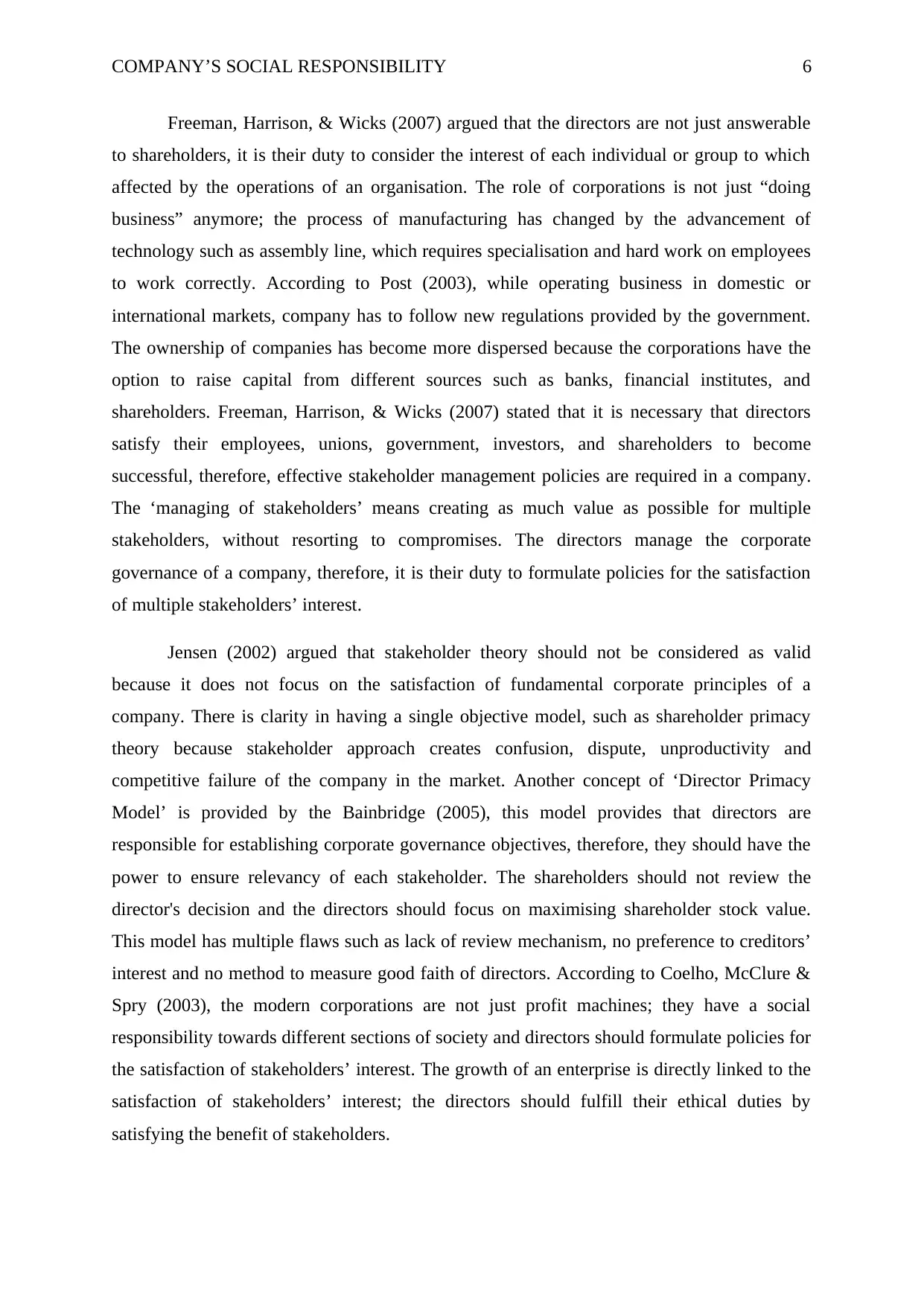
COMPANY’S SOCIAL RESPONSIBILITY 6
Freeman, Harrison, & Wicks (2007) argued that the directors are not just answerable
to shareholders, it is their duty to consider the interest of each individual or group to which
affected by the operations of an organisation. The role of corporations is not just “doing
business” anymore; the process of manufacturing has changed by the advancement of
technology such as assembly line, which requires specialisation and hard work on employees
to work correctly. According to Post (2003), while operating business in domestic or
international markets, company has to follow new regulations provided by the government.
The ownership of companies has become more dispersed because the corporations have the
option to raise capital from different sources such as banks, financial institutes, and
shareholders. Freeman, Harrison, & Wicks (2007) stated that it is necessary that directors
satisfy their employees, unions, government, investors, and shareholders to become
successful, therefore, effective stakeholder management policies are required in a company.
The ‘managing of stakeholders’ means creating as much value as possible for multiple
stakeholders, without resorting to compromises. The directors manage the corporate
governance of a company, therefore, it is their duty to formulate policies for the satisfaction
of multiple stakeholders’ interest.
Jensen (2002) argued that stakeholder theory should not be considered as valid
because it does not focus on the satisfaction of fundamental corporate principles of a
company. There is clarity in having a single objective model, such as shareholder primacy
theory because stakeholder approach creates confusion, dispute, unproductivity and
competitive failure of the company in the market. Another concept of ‘Director Primacy
Model’ is provided by the Bainbridge (2005), this model provides that directors are
responsible for establishing corporate governance objectives, therefore, they should have the
power to ensure relevancy of each stakeholder. The shareholders should not review the
director's decision and the directors should focus on maximising shareholder stock value.
This model has multiple flaws such as lack of review mechanism, no preference to creditors’
interest and no method to measure good faith of directors. According to Coelho, McClure &
Spry (2003), the modern corporations are not just profit machines; they have a social
responsibility towards different sections of society and directors should formulate policies for
the satisfaction of stakeholders’ interest. The growth of an enterprise is directly linked to the
satisfaction of stakeholders’ interest; the directors should fulfill their ethical duties by
satisfying the benefit of stakeholders.
Freeman, Harrison, & Wicks (2007) argued that the directors are not just answerable
to shareholders, it is their duty to consider the interest of each individual or group to which
affected by the operations of an organisation. The role of corporations is not just “doing
business” anymore; the process of manufacturing has changed by the advancement of
technology such as assembly line, which requires specialisation and hard work on employees
to work correctly. According to Post (2003), while operating business in domestic or
international markets, company has to follow new regulations provided by the government.
The ownership of companies has become more dispersed because the corporations have the
option to raise capital from different sources such as banks, financial institutes, and
shareholders. Freeman, Harrison, & Wicks (2007) stated that it is necessary that directors
satisfy their employees, unions, government, investors, and shareholders to become
successful, therefore, effective stakeholder management policies are required in a company.
The ‘managing of stakeholders’ means creating as much value as possible for multiple
stakeholders, without resorting to compromises. The directors manage the corporate
governance of a company, therefore, it is their duty to formulate policies for the satisfaction
of multiple stakeholders’ interest.
Jensen (2002) argued that stakeholder theory should not be considered as valid
because it does not focus on the satisfaction of fundamental corporate principles of a
company. There is clarity in having a single objective model, such as shareholder primacy
theory because stakeholder approach creates confusion, dispute, unproductivity and
competitive failure of the company in the market. Another concept of ‘Director Primacy
Model’ is provided by the Bainbridge (2005), this model provides that directors are
responsible for establishing corporate governance objectives, therefore, they should have the
power to ensure relevancy of each stakeholder. The shareholders should not review the
director's decision and the directors should focus on maximising shareholder stock value.
This model has multiple flaws such as lack of review mechanism, no preference to creditors’
interest and no method to measure good faith of directors. According to Coelho, McClure &
Spry (2003), the modern corporations are not just profit machines; they have a social
responsibility towards different sections of society and directors should formulate policies for
the satisfaction of stakeholders’ interest. The growth of an enterprise is directly linked to the
satisfaction of stakeholders’ interest; the directors should fulfill their ethical duties by
satisfying the benefit of stakeholders.
Paraphrase This Document
Need a fresh take? Get an instant paraphrase of this document with our AI Paraphraser
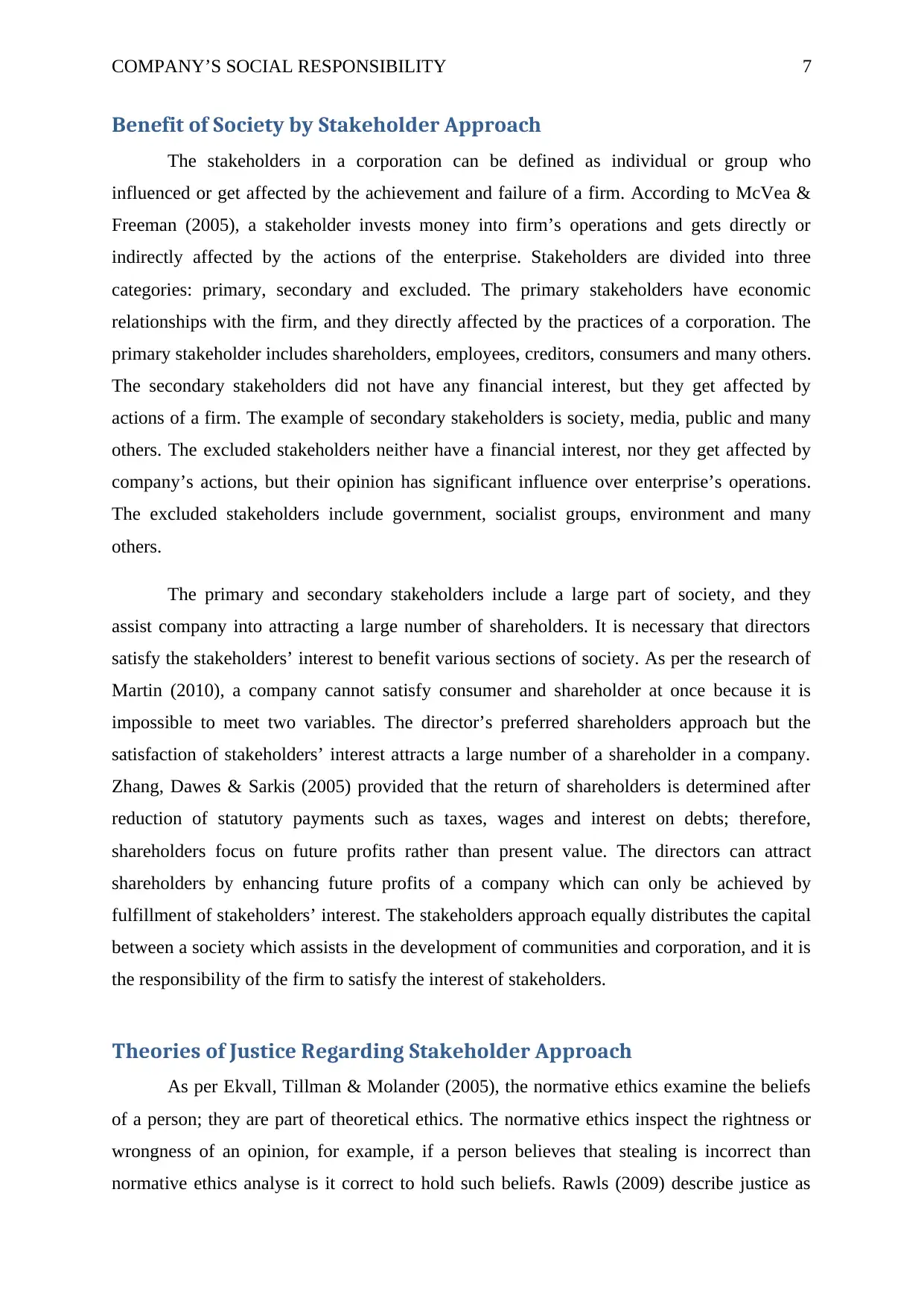
COMPANY’S SOCIAL RESPONSIBILITY 7
Benefit of Society by Stakeholder Approach
The stakeholders in a corporation can be defined as individual or group who
influenced or get affected by the achievement and failure of a firm. According to McVea &
Freeman (2005), a stakeholder invests money into firm’s operations and gets directly or
indirectly affected by the actions of the enterprise. Stakeholders are divided into three
categories: primary, secondary and excluded. The primary stakeholders have economic
relationships with the firm, and they directly affected by the practices of a corporation. The
primary stakeholder includes shareholders, employees, creditors, consumers and many others.
The secondary stakeholders did not have any financial interest, but they get affected by
actions of a firm. The example of secondary stakeholders is society, media, public and many
others. The excluded stakeholders neither have a financial interest, nor they get affected by
company’s actions, but their opinion has significant influence over enterprise’s operations.
The excluded stakeholders include government, socialist groups, environment and many
others.
The primary and secondary stakeholders include a large part of society, and they
assist company into attracting a large number of shareholders. It is necessary that directors
satisfy the stakeholders’ interest to benefit various sections of society. As per the research of
Martin (2010), a company cannot satisfy consumer and shareholder at once because it is
impossible to meet two variables. The director’s preferred shareholders approach but the
satisfaction of stakeholders’ interest attracts a large number of a shareholder in a company.
Zhang, Dawes & Sarkis (2005) provided that the return of shareholders is determined after
reduction of statutory payments such as taxes, wages and interest on debts; therefore,
shareholders focus on future profits rather than present value. The directors can attract
shareholders by enhancing future profits of a company which can only be achieved by
fulfillment of stakeholders’ interest. The stakeholders approach equally distributes the capital
between a society which assists in the development of communities and corporation, and it is
the responsibility of the firm to satisfy the interest of stakeholders.
Theories of Justice Regarding Stakeholder Approach
As per Ekvall, Tillman & Molander (2005), the normative ethics examine the beliefs
of a person; they are part of theoretical ethics. The normative ethics inspect the rightness or
wrongness of an opinion, for example, if a person believes that stealing is incorrect than
normative ethics analyse is it correct to hold such beliefs. Rawls (2009) describe justice as
Benefit of Society by Stakeholder Approach
The stakeholders in a corporation can be defined as individual or group who
influenced or get affected by the achievement and failure of a firm. According to McVea &
Freeman (2005), a stakeholder invests money into firm’s operations and gets directly or
indirectly affected by the actions of the enterprise. Stakeholders are divided into three
categories: primary, secondary and excluded. The primary stakeholders have economic
relationships with the firm, and they directly affected by the practices of a corporation. The
primary stakeholder includes shareholders, employees, creditors, consumers and many others.
The secondary stakeholders did not have any financial interest, but they get affected by
actions of a firm. The example of secondary stakeholders is society, media, public and many
others. The excluded stakeholders neither have a financial interest, nor they get affected by
company’s actions, but their opinion has significant influence over enterprise’s operations.
The excluded stakeholders include government, socialist groups, environment and many
others.
The primary and secondary stakeholders include a large part of society, and they
assist company into attracting a large number of shareholders. It is necessary that directors
satisfy the stakeholders’ interest to benefit various sections of society. As per the research of
Martin (2010), a company cannot satisfy consumer and shareholder at once because it is
impossible to meet two variables. The director’s preferred shareholders approach but the
satisfaction of stakeholders’ interest attracts a large number of a shareholder in a company.
Zhang, Dawes & Sarkis (2005) provided that the return of shareholders is determined after
reduction of statutory payments such as taxes, wages and interest on debts; therefore,
shareholders focus on future profits rather than present value. The directors can attract
shareholders by enhancing future profits of a company which can only be achieved by
fulfillment of stakeholders’ interest. The stakeholders approach equally distributes the capital
between a society which assists in the development of communities and corporation, and it is
the responsibility of the firm to satisfy the interest of stakeholders.
Theories of Justice Regarding Stakeholder Approach
As per Ekvall, Tillman & Molander (2005), the normative ethics examine the beliefs
of a person; they are part of theoretical ethics. The normative ethics inspect the rightness or
wrongness of an opinion, for example, if a person believes that stealing is incorrect than
normative ethics analyse is it correct to hold such beliefs. Rawls (2009) describe justice as
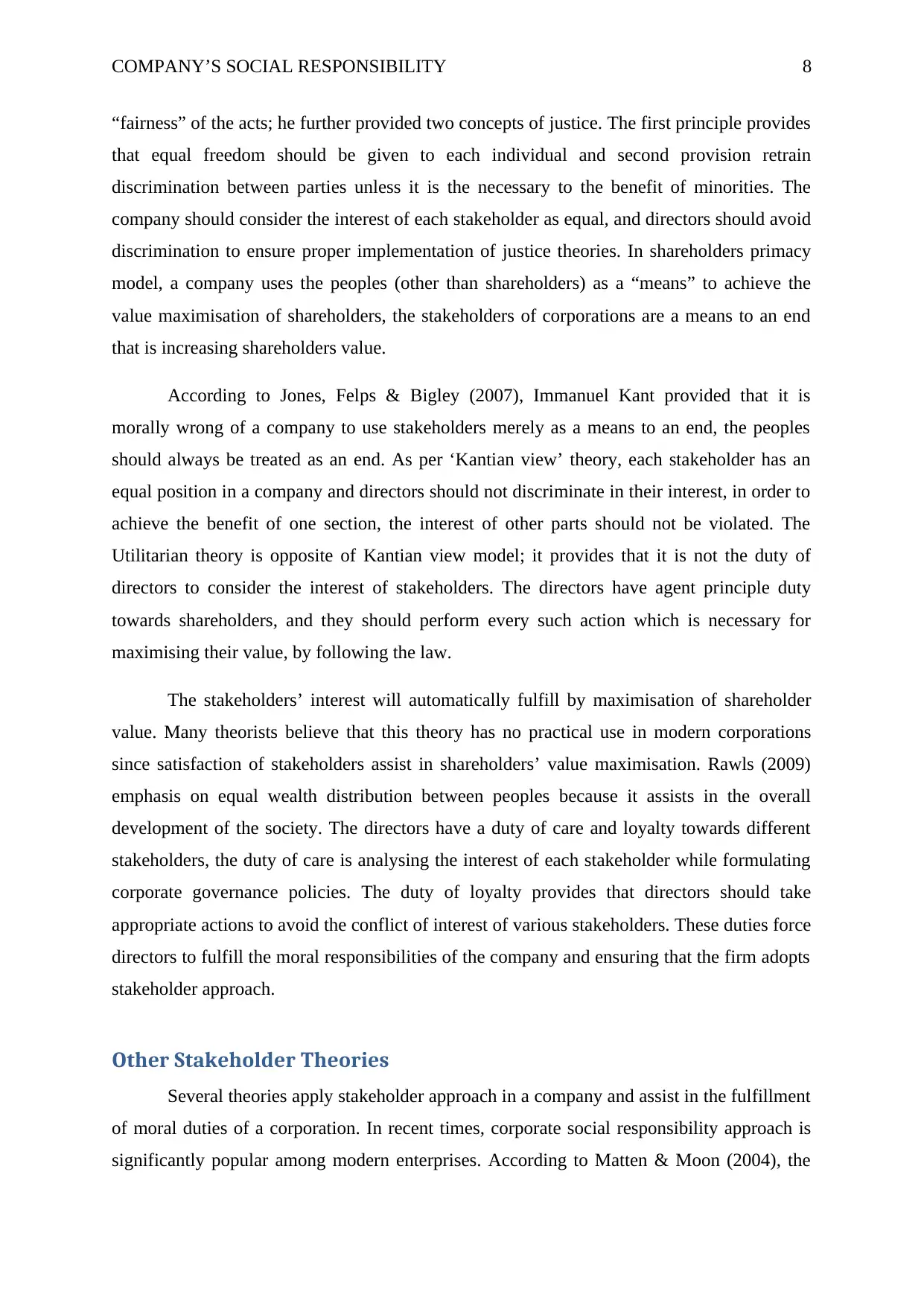
COMPANY’S SOCIAL RESPONSIBILITY 8
“fairness” of the acts; he further provided two concepts of justice. The first principle provides
that equal freedom should be given to each individual and second provision retrain
discrimination between parties unless it is the necessary to the benefit of minorities. The
company should consider the interest of each stakeholder as equal, and directors should avoid
discrimination to ensure proper implementation of justice theories. In shareholders primacy
model, a company uses the peoples (other than shareholders) as a “means” to achieve the
value maximisation of shareholders, the stakeholders of corporations are a means to an end
that is increasing shareholders value.
According to Jones, Felps & Bigley (2007), Immanuel Kant provided that it is
morally wrong of a company to use stakeholders merely as a means to an end, the peoples
should always be treated as an end. As per ‘Kantian view’ theory, each stakeholder has an
equal position in a company and directors should not discriminate in their interest, in order to
achieve the benefit of one section, the interest of other parts should not be violated. The
Utilitarian theory is opposite of Kantian view model; it provides that it is not the duty of
directors to consider the interest of stakeholders. The directors have agent principle duty
towards shareholders, and they should perform every such action which is necessary for
maximising their value, by following the law.
The stakeholders’ interest will automatically fulfill by maximisation of shareholder
value. Many theorists believe that this theory has no practical use in modern corporations
since satisfaction of stakeholders assist in shareholders’ value maximisation. Rawls (2009)
emphasis on equal wealth distribution between peoples because it assists in the overall
development of the society. The directors have a duty of care and loyalty towards different
stakeholders, the duty of care is analysing the interest of each stakeholder while formulating
corporate governance policies. The duty of loyalty provides that directors should take
appropriate actions to avoid the conflict of interest of various stakeholders. These duties force
directors to fulfill the moral responsibilities of the company and ensuring that the firm adopts
stakeholder approach.
Other Stakeholder Theories
Several theories apply stakeholder approach in a company and assist in the fulfillment
of moral duties of a corporation. In recent times, corporate social responsibility approach is
significantly popular among modern enterprises. According to Matten & Moon (2004), the
“fairness” of the acts; he further provided two concepts of justice. The first principle provides
that equal freedom should be given to each individual and second provision retrain
discrimination between parties unless it is the necessary to the benefit of minorities. The
company should consider the interest of each stakeholder as equal, and directors should avoid
discrimination to ensure proper implementation of justice theories. In shareholders primacy
model, a company uses the peoples (other than shareholders) as a “means” to achieve the
value maximisation of shareholders, the stakeholders of corporations are a means to an end
that is increasing shareholders value.
According to Jones, Felps & Bigley (2007), Immanuel Kant provided that it is
morally wrong of a company to use stakeholders merely as a means to an end, the peoples
should always be treated as an end. As per ‘Kantian view’ theory, each stakeholder has an
equal position in a company and directors should not discriminate in their interest, in order to
achieve the benefit of one section, the interest of other parts should not be violated. The
Utilitarian theory is opposite of Kantian view model; it provides that it is not the duty of
directors to consider the interest of stakeholders. The directors have agent principle duty
towards shareholders, and they should perform every such action which is necessary for
maximising their value, by following the law.
The stakeholders’ interest will automatically fulfill by maximisation of shareholder
value. Many theorists believe that this theory has no practical use in modern corporations
since satisfaction of stakeholders assist in shareholders’ value maximisation. Rawls (2009)
emphasis on equal wealth distribution between peoples because it assists in the overall
development of the society. The directors have a duty of care and loyalty towards different
stakeholders, the duty of care is analysing the interest of each stakeholder while formulating
corporate governance policies. The duty of loyalty provides that directors should take
appropriate actions to avoid the conflict of interest of various stakeholders. These duties force
directors to fulfill the moral responsibilities of the company and ensuring that the firm adopts
stakeholder approach.
Other Stakeholder Theories
Several theories apply stakeholder approach in a company and assist in the fulfillment
of moral duties of a corporation. In recent times, corporate social responsibility approach is
significantly popular among modern enterprises. According to Matten & Moon (2004), the
⊘ This is a preview!⊘
Do you want full access?
Subscribe today to unlock all pages.

Trusted by 1+ million students worldwide
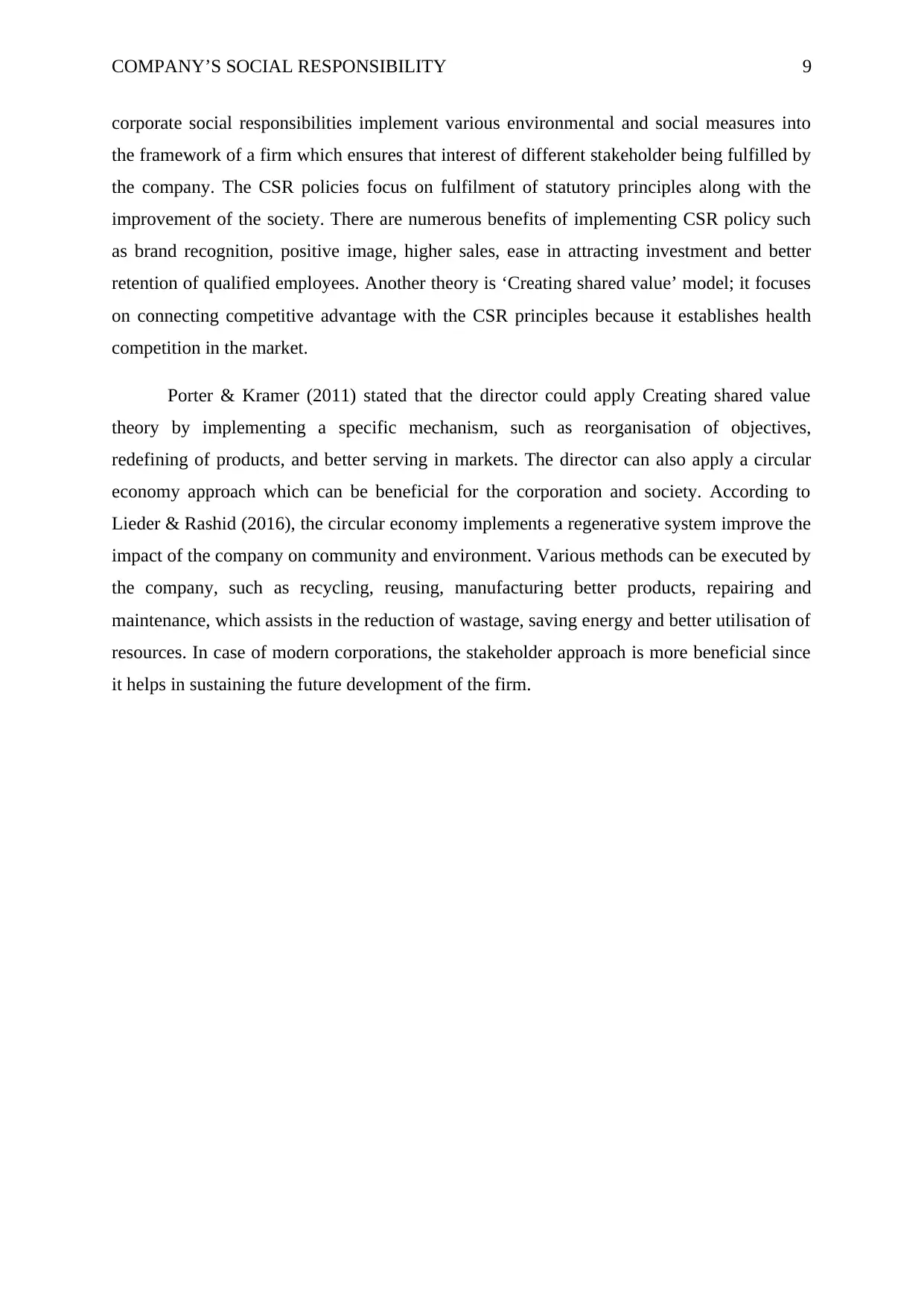
COMPANY’S SOCIAL RESPONSIBILITY 9
corporate social responsibilities implement various environmental and social measures into
the framework of a firm which ensures that interest of different stakeholder being fulfilled by
the company. The CSR policies focus on fulfilment of statutory principles along with the
improvement of the society. There are numerous benefits of implementing CSR policy such
as brand recognition, positive image, higher sales, ease in attracting investment and better
retention of qualified employees. Another theory is ‘Creating shared value’ model; it focuses
on connecting competitive advantage with the CSR principles because it establishes health
competition in the market.
Porter & Kramer (2011) stated that the director could apply Creating shared value
theory by implementing a specific mechanism, such as reorganisation of objectives,
redefining of products, and better serving in markets. The director can also apply a circular
economy approach which can be beneficial for the corporation and society. According to
Lieder & Rashid (2016), the circular economy implements a regenerative system improve the
impact of the company on community and environment. Various methods can be executed by
the company, such as recycling, reusing, manufacturing better products, repairing and
maintenance, which assists in the reduction of wastage, saving energy and better utilisation of
resources. In case of modern corporations, the stakeholder approach is more beneficial since
it helps in sustaining the future development of the firm.
corporate social responsibilities implement various environmental and social measures into
the framework of a firm which ensures that interest of different stakeholder being fulfilled by
the company. The CSR policies focus on fulfilment of statutory principles along with the
improvement of the society. There are numerous benefits of implementing CSR policy such
as brand recognition, positive image, higher sales, ease in attracting investment and better
retention of qualified employees. Another theory is ‘Creating shared value’ model; it focuses
on connecting competitive advantage with the CSR principles because it establishes health
competition in the market.
Porter & Kramer (2011) stated that the director could apply Creating shared value
theory by implementing a specific mechanism, such as reorganisation of objectives,
redefining of products, and better serving in markets. The director can also apply a circular
economy approach which can be beneficial for the corporation and society. According to
Lieder & Rashid (2016), the circular economy implements a regenerative system improve the
impact of the company on community and environment. Various methods can be executed by
the company, such as recycling, reusing, manufacturing better products, repairing and
maintenance, which assists in the reduction of wastage, saving energy and better utilisation of
resources. In case of modern corporations, the stakeholder approach is more beneficial since
it helps in sustaining the future development of the firm.
Paraphrase This Document
Need a fresh take? Get an instant paraphrase of this document with our AI Paraphraser
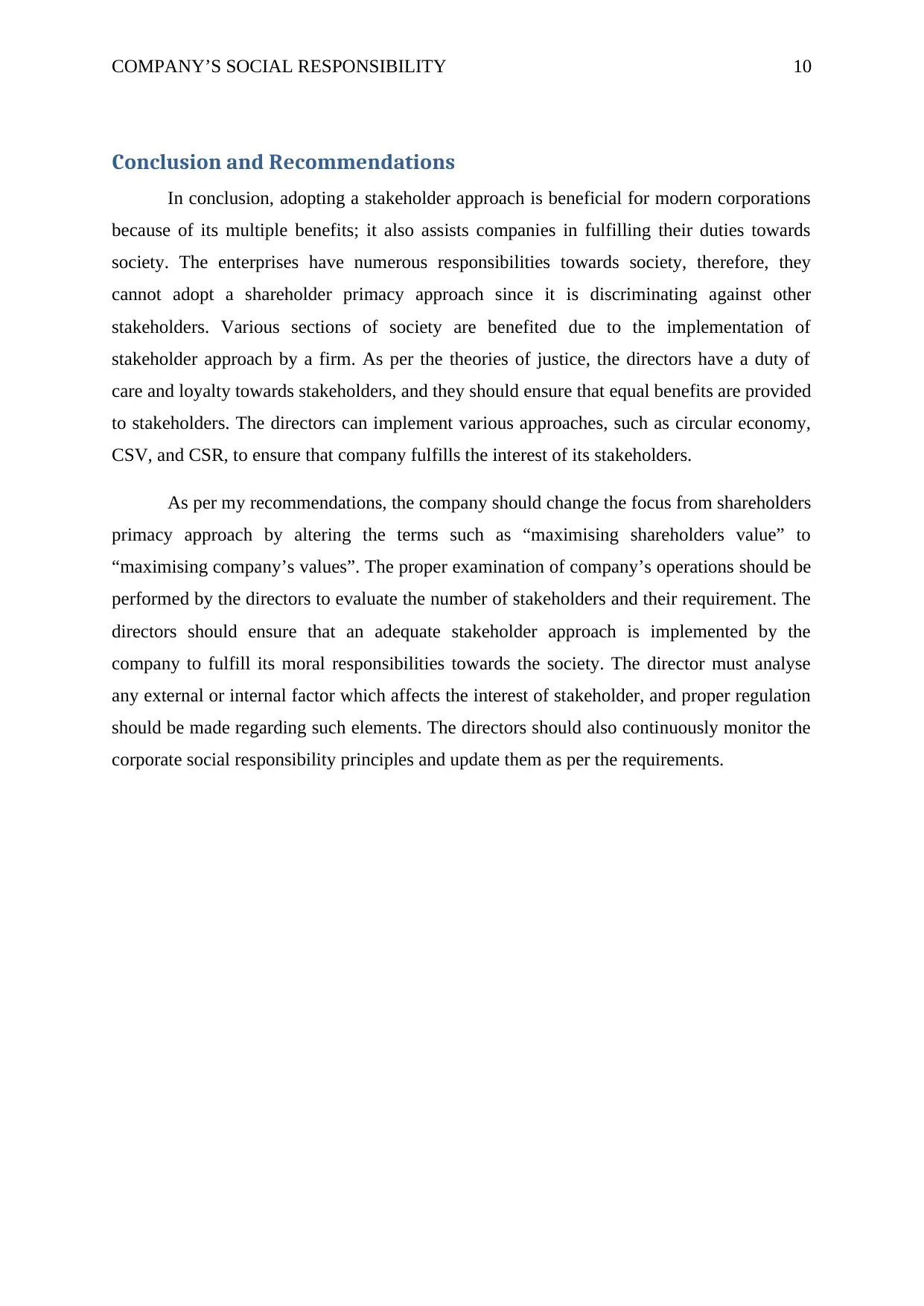
COMPANY’S SOCIAL RESPONSIBILITY 10
Conclusion and Recommendations
In conclusion, adopting a stakeholder approach is beneficial for modern corporations
because of its multiple benefits; it also assists companies in fulfilling their duties towards
society. The enterprises have numerous responsibilities towards society, therefore, they
cannot adopt a shareholder primacy approach since it is discriminating against other
stakeholders. Various sections of society are benefited due to the implementation of
stakeholder approach by a firm. As per the theories of justice, the directors have a duty of
care and loyalty towards stakeholders, and they should ensure that equal benefits are provided
to stakeholders. The directors can implement various approaches, such as circular economy,
CSV, and CSR, to ensure that company fulfills the interest of its stakeholders.
As per my recommendations, the company should change the focus from shareholders
primacy approach by altering the terms such as “maximising shareholders value” to
“maximising company’s values”. The proper examination of company’s operations should be
performed by the directors to evaluate the number of stakeholders and their requirement. The
directors should ensure that an adequate stakeholder approach is implemented by the
company to fulfill its moral responsibilities towards the society. The director must analyse
any external or internal factor which affects the interest of stakeholder, and proper regulation
should be made regarding such elements. The directors should also continuously monitor the
corporate social responsibility principles and update them as per the requirements.
Conclusion and Recommendations
In conclusion, adopting a stakeholder approach is beneficial for modern corporations
because of its multiple benefits; it also assists companies in fulfilling their duties towards
society. The enterprises have numerous responsibilities towards society, therefore, they
cannot adopt a shareholder primacy approach since it is discriminating against other
stakeholders. Various sections of society are benefited due to the implementation of
stakeholder approach by a firm. As per the theories of justice, the directors have a duty of
care and loyalty towards stakeholders, and they should ensure that equal benefits are provided
to stakeholders. The directors can implement various approaches, such as circular economy,
CSV, and CSR, to ensure that company fulfills the interest of its stakeholders.
As per my recommendations, the company should change the focus from shareholders
primacy approach by altering the terms such as “maximising shareholders value” to
“maximising company’s values”. The proper examination of company’s operations should be
performed by the directors to evaluate the number of stakeholders and their requirement. The
directors should ensure that an adequate stakeholder approach is implemented by the
company to fulfill its moral responsibilities towards the society. The director must analyse
any external or internal factor which affects the interest of stakeholder, and proper regulation
should be made regarding such elements. The directors should also continuously monitor the
corporate social responsibility principles and update them as per the requirements.
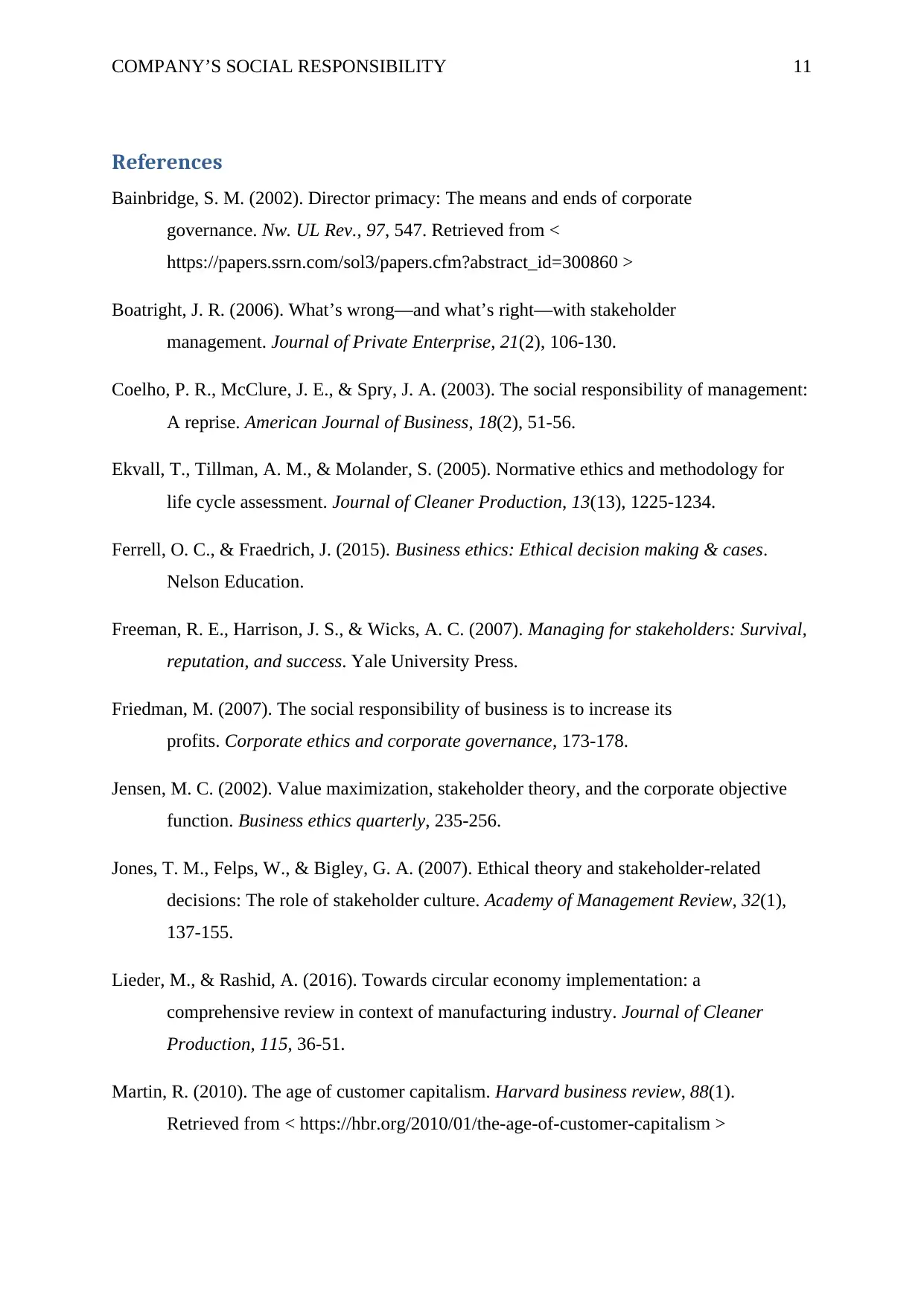
COMPANY’S SOCIAL RESPONSIBILITY 11
References
Bainbridge, S. M. (2002). Director primacy: The means and ends of corporate
governance. Nw. UL Rev., 97, 547. Retrieved from <
https://papers.ssrn.com/sol3/papers.cfm?abstract_id=300860 >
Boatright, J. R. (2006). What’s wrong—and what’s right—with stakeholder
management. Journal of Private Enterprise, 21(2), 106-130.
Coelho, P. R., McClure, J. E., & Spry, J. A. (2003). The social responsibility of management:
A reprise. American Journal of Business, 18(2), 51-56.
Ekvall, T., Tillman, A. M., & Molander, S. (2005). Normative ethics and methodology for
life cycle assessment. Journal of Cleaner Production, 13(13), 1225-1234.
Ferrell, O. C., & Fraedrich, J. (2015). Business ethics: Ethical decision making & cases.
Nelson Education.
Freeman, R. E., Harrison, J. S., & Wicks, A. C. (2007). Managing for stakeholders: Survival,
reputation, and success. Yale University Press.
Friedman, M. (2007). The social responsibility of business is to increase its
profits. Corporate ethics and corporate governance, 173-178.
Jensen, M. C. (2002). Value maximization, stakeholder theory, and the corporate objective
function. Business ethics quarterly, 235-256.
Jones, T. M., Felps, W., & Bigley, G. A. (2007). Ethical theory and stakeholder-related
decisions: The role of stakeholder culture. Academy of Management Review, 32(1),
137-155.
Lieder, M., & Rashid, A. (2016). Towards circular economy implementation: a
comprehensive review in context of manufacturing industry. Journal of Cleaner
Production, 115, 36-51.
Martin, R. (2010). The age of customer capitalism. Harvard business review, 88(1).
Retrieved from < https://hbr.org/2010/01/the-age-of-customer-capitalism >
References
Bainbridge, S. M. (2002). Director primacy: The means and ends of corporate
governance. Nw. UL Rev., 97, 547. Retrieved from <
https://papers.ssrn.com/sol3/papers.cfm?abstract_id=300860 >
Boatright, J. R. (2006). What’s wrong—and what’s right—with stakeholder
management. Journal of Private Enterprise, 21(2), 106-130.
Coelho, P. R., McClure, J. E., & Spry, J. A. (2003). The social responsibility of management:
A reprise. American Journal of Business, 18(2), 51-56.
Ekvall, T., Tillman, A. M., & Molander, S. (2005). Normative ethics and methodology for
life cycle assessment. Journal of Cleaner Production, 13(13), 1225-1234.
Ferrell, O. C., & Fraedrich, J. (2015). Business ethics: Ethical decision making & cases.
Nelson Education.
Freeman, R. E., Harrison, J. S., & Wicks, A. C. (2007). Managing for stakeholders: Survival,
reputation, and success. Yale University Press.
Friedman, M. (2007). The social responsibility of business is to increase its
profits. Corporate ethics and corporate governance, 173-178.
Jensen, M. C. (2002). Value maximization, stakeholder theory, and the corporate objective
function. Business ethics quarterly, 235-256.
Jones, T. M., Felps, W., & Bigley, G. A. (2007). Ethical theory and stakeholder-related
decisions: The role of stakeholder culture. Academy of Management Review, 32(1),
137-155.
Lieder, M., & Rashid, A. (2016). Towards circular economy implementation: a
comprehensive review in context of manufacturing industry. Journal of Cleaner
Production, 115, 36-51.
Martin, R. (2010). The age of customer capitalism. Harvard business review, 88(1).
Retrieved from < https://hbr.org/2010/01/the-age-of-customer-capitalism >
⊘ This is a preview!⊘
Do you want full access?
Subscribe today to unlock all pages.

Trusted by 1+ million students worldwide
1 out of 13
Related Documents
Your All-in-One AI-Powered Toolkit for Academic Success.
+13062052269
info@desklib.com
Available 24*7 on WhatsApp / Email
![[object Object]](/_next/static/media/star-bottom.7253800d.svg)
Unlock your academic potential
Copyright © 2020–2026 A2Z Services. All Rights Reserved. Developed and managed by ZUCOL.




